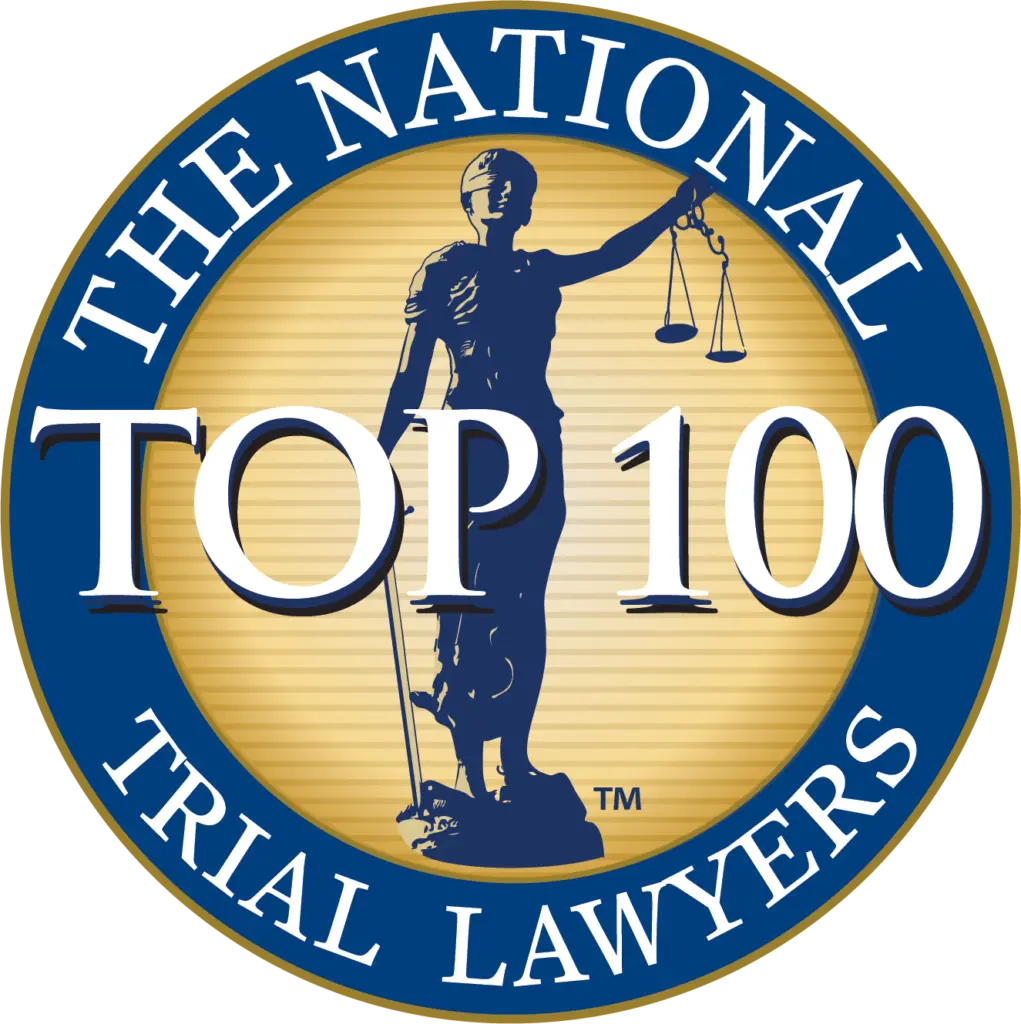
Member of the Colorado Bar Association since 2014. Attorney, Christopher M. Nicolaysen focuses primarily on helping those injured in Colorado car accidents, other auto accidents, and Colorado personal injury incidents.
This article has been written and reviewed for legal accuracy and clarity by the team of writers and attorneys at Springs Law Group and is as accurate as possible. This content should not be taken as legal advice from an attorney. If you would like to learn more about our owner and experienced Colorado personal injury lawyer, Christopher Nicolaysen, you can do so here.
Springs Law Group does everything possible to make sure the information in this article is up to date and accurate. If you need specific legal advice about your case, contact us. This article should not be taken as advice from an attorney.
After a car accident in Denver, there are several options for paying medical bills, including using your auto insurance's MedPay coverage, billing your health insurance provider, working with a personal injury law firm to arrange liens, utilizing the at-fault driver's liability insurance, or tapping into your UM/UIM coverage.
Keeping detailed records of your medical treatment and working closely with a skilled personal injury attorney can help ensure your bills are paid and you receive fair compensation for your injuries and damages.
Contacting an experienced Denver personal injury law firm can provide invaluable guidance and support throughout the claims process, allowing you to focus on recovery while your attorney works to secure the best possible outcome for your case.
On this page, we’ll discuss who pays medical bills after a car accident in Denver, the role of car insurance in covering medical expenses, steps to take to ensure your medical bills are paid, and much more.
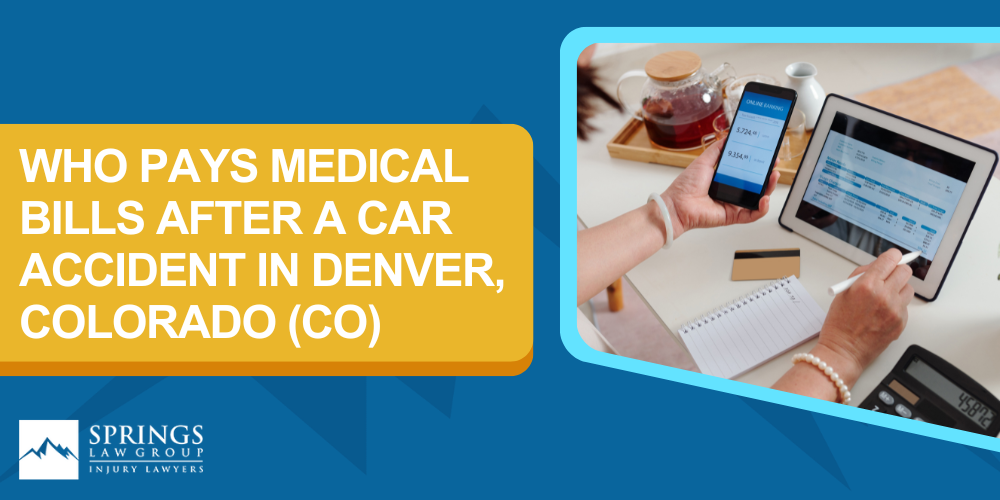
The following are key aspects of who pays medical bills after a car accident in Denver, including but not limited to:
If you’ve been injured in a car accident in Denver and are struggling with medical bills, consulting with an experienced car accident attorney can help you understand your options for seeking compensation.
Contact Springs Law Group today for a free consultation to discuss your case and learn how we can help you get the compensation you deserve.

After a car accident in Denver, one of the biggest concerns is who will pay for the medical bills incurred due to injuries sustained in the crash.
It’s essential to understand the various options available to ensure that you receive the necessary medical treatment without facing financial hardship.
When you’re involved in a car accident, the last thing you want to worry about is how you’ll pay for your medical expenses.
Fortunately, there are several ways to cover these costs, depending on your specific situation and the types of insurance coverage available to you.
Here are the main options for paying medical bills after a car accident in Denver:
Understanding these options can help you make informed decisions about your medical care and financial well-being.
Regardless of who ultimately pays for your medical bills, it’s crucial to seek medical attention as soon as possible after a car accident.
Even if you feel fine or believe your injuries are minor, some symptoms may not appear until days or weeks later.
Prompt medical care not only ensures that you receive the necessary treatment for your injuries but also creates a record of your medical expenses and ties them directly to the accident.
This documentation can be essential when seeking compensation from insurance companies or pursuing a personal injury claim.
One of the first places to turn when facing medical bills after a car accident is your own auto insurance policy.
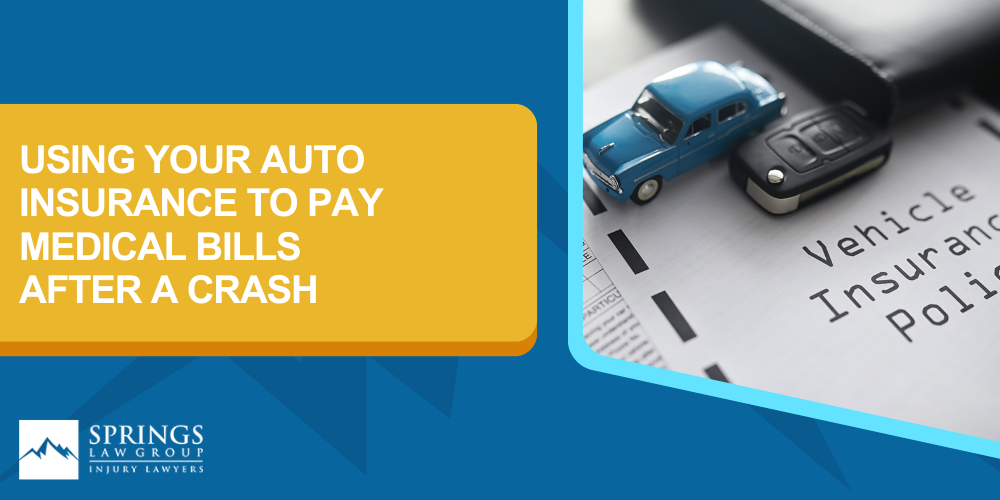
Many Colorado drivers have Medical Payments (MedPay) coverage, which can help cover medical expenses regardless of who was at fault for the accident.
Medical Payments coverage, also known as MedPay, is an optional type of auto insurance that covers medical expenses for you and your passengers in the event of a car accident.
In Colorado, if you choose not to have MedPay coverage, you must sign a waiver stating that you declined this option.
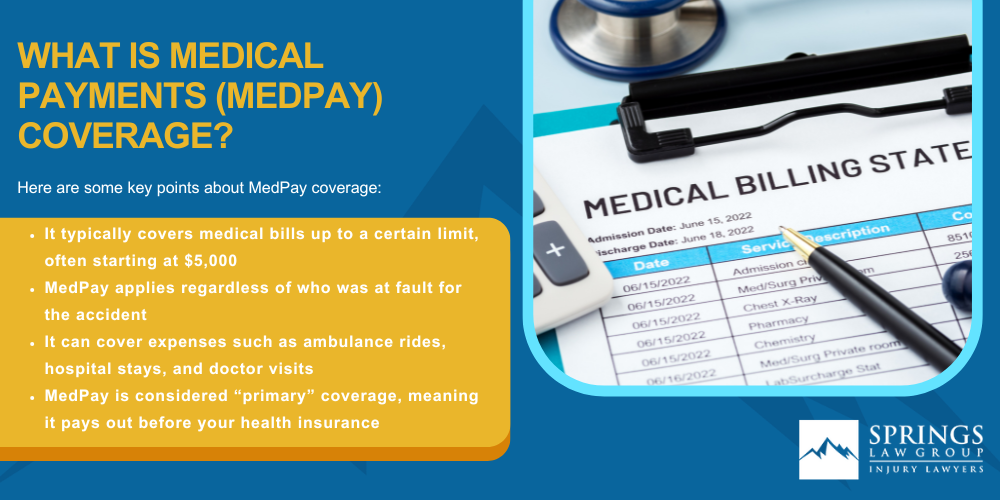
Here are some key points about MedPay coverage:
If you’re unsure whether you have MedPay coverage, check your auto insurance policy’s declarations page or contact your insurance agent.
If you have MedPay coverage and have been injured in a car accident, inform your medical providers that you would like to use this coverage to pay for your treatment.
Your providers will then bill your auto insurance company directly, reducing your out-of-pocket expenses.
Keep in mind that MedPay coverage has limits, so if your medical bills exceed your coverage amount, you may need to explore other options, such as billing your health insurance or working with a personal injury law firm to arrange liens with medical providers.
Another option for paying medical bills after a car accident is to use your health insurance coverage.
While your health insurance provider may initially cover your expenses, they may later seek reimbursement from your settlement or the at-fault driver’s insurance company.
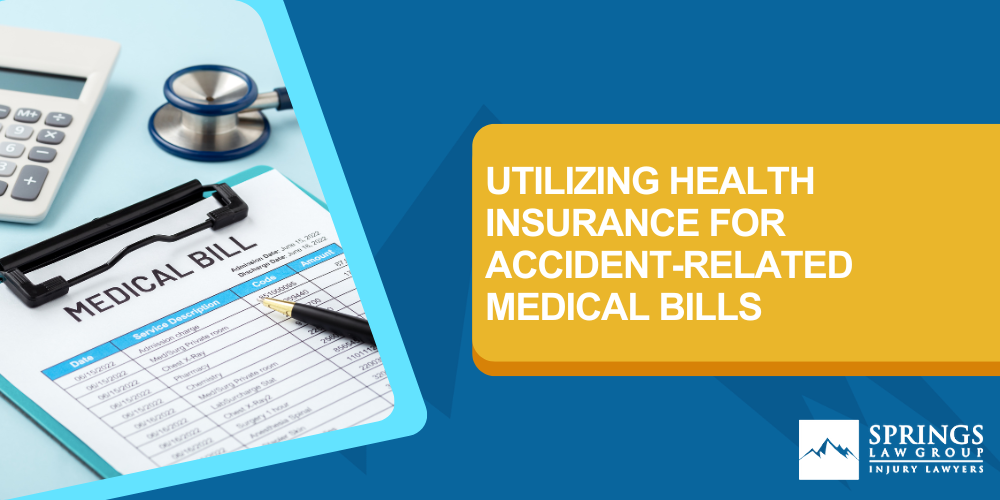
If you have health insurance, provide your policy information to your medical providers when seeking treatment for accident-related injuries.
Your health insurance company will then cover your medical bills according to your policy’s terms, such as deductibles, copayments, and coinsurance.
It’s important to note that your health insurance company may require you to pay back a portion of the medical expenses they covered if you receive a settlement from the at-fault driver’s insurance company.
This process is known as subrogation.
Subrogation is the legal right of your health insurance company to seek reimbursement for the medical expenses they paid on your behalf if you receive compensation from a third party, such as the at-fault driver’s insurance company.
Your health insurer may place a lien on your settlement to ensure they are repaid.
When working with a personal injury law firm, your attorney will negotiate with your health insurance company to minimize the amount you must pay back from your settlement.
This ensures that you receive the maximum compensation possible for your injuries and other damages.
Hiring a personal injury attorney can be invaluable when dealing with medical bills after a car accident.
Your lawyer can help manage your bills, communicate with insurance companies, and ensure that you receive the compensation you deserve.
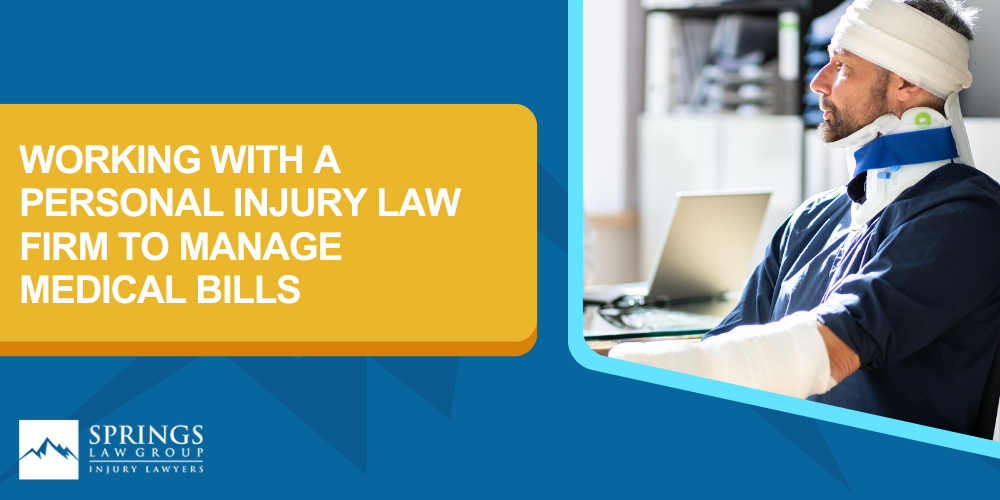
One way a personal injury law firm such as Springs Law Group can help manage your medical bills is by arranging liens with your medical providers.
A lien is a legal agreement between your attorney and your healthcare provider, stating that the provider will be paid from your settlement or judgment.
Here are some benefits of having your law firm arrange liens:
By working with a personal injury law firm, you can focus on your recovery while your attorney handles the legal and financial aspects of your case.
When your personal injury case is resolved through a settlement or judgment, your attorney will use a portion of the funds to pay back your medical bills and any liens placed on your settlement.
Your law firm will provide you with an itemized list of the providers being paid and the amounts owed.
Your attorney will also negotiate with your healthcare providers and insurance companies to reduce the amount you owe, ensuring that you receive the maximum compensation possible for your injuries and other damages.
In some cases, the at-fault driver may not have enough liability insurance to cover your medical bills and other damages.
If this happens, you may need to rely on your own Uninsured/Underinsured Motorist (UM/UIM) coverage.
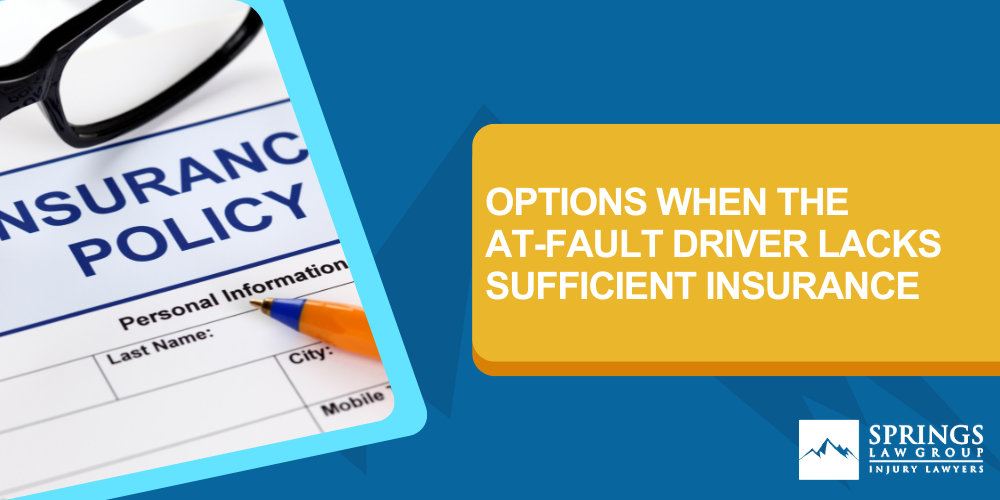
Uninsured/Underinsured Motorist coverage is an optional type of auto insurance that protects you if you’re involved in an accident with a driver who either has no insurance or doesn’t have enough coverage to pay for your damages.
UM/UIM coverage can help pay for your medical bills, lost wages, and other expenses related to the accident.
Here are some key points about UM/UIM coverage:
If you’re unsure whether you have UM/UIM coverage, check your auto insurance policy or contact your insurance agent.
If the at-fault driver’s liability insurance is insufficient to cover your medical bills, you can turn to your UM/UIM coverage to pay the remaining expenses.
Your personal injury attorney can help you navigate the process of filing a claim with your own insurance company and negotiating a settlement.
Keep in mind that your UM/UIM coverage limits will determine the maximum amount you can receive from your insurance company.
If your damages exceed these limits, you may need to explore other options, such as filing a personal injury lawsuit against the at-fault driver.
Maintaining accurate records of your medical treatment after a car accident is crucial for both your health and your personal injury claim.
Detailed documentation can help your attorney build a strong case and ensure that you receive fair compensation for your injuries.
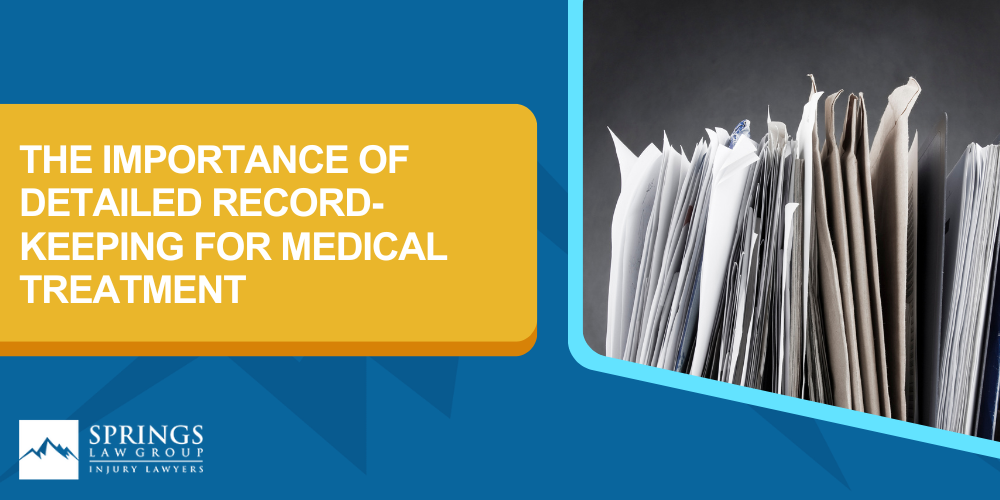
To keep track of your medical treatment, create a log that includes the following information for each healthcare provider you visit:
In addition to this log, keep copies of all medical bills, receipts, and other documentation related to your treatment.
Share your medical treatment log and related documentation with your personal injury attorney.
This information will help your lawyer understand the extent of your injuries, the treatment you’ve received, and the costs associated with your recovery.
Your attorney will use this information to build a strong case on your behalf, negotiate with insurance companies, and ensure that you receive fair compensation for your medical expenses, lost wages, pain and suffering, and other damages.
Dealing with medical bills and insurance companies after a car accident can be overwhelming, especially when you’re trying to focus on your recovery.
Hiring a skilled personal injury attorney can help reduce your stress and allow you to prioritize your health and well-being.
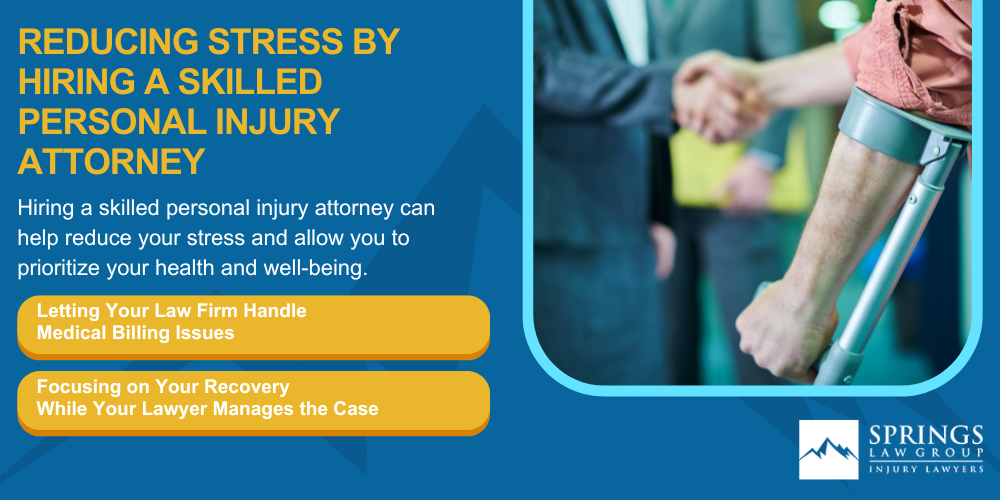
When you work with a personal injury law firm, your attorney will take on the responsibility of managing your medical bills and communicating with insurance companies.
This includes:
By allowing your law firm to handle these tasks, you can focus on your recovery and avoid the stress of dealing with complex legal and financial issues.
Hiring a personal injury attorney allows you to prioritize your physical and emotional recovery after a car accident.
While your lawyer manages the legal aspects of your case, you can concentrate on:
With a skilled attorney by your side, you can have peace of mind knowing that your case is in good hands and that your rights are being protected.
The process of paying medical bills after a car accident in Denver can be complex and stressful, but understanding your options and seeking the help of a skilled personal injury attorney can make a significant difference in your recovery and financial well-being.
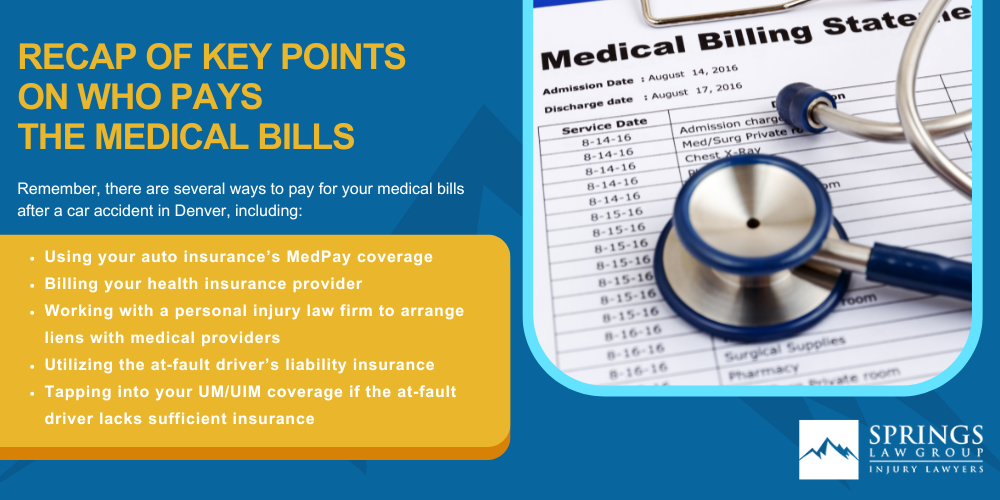
Remember, there are several ways to pay for your medical bills after a car accident in Denver, including:
By keeping detailed records of your medical treatment and working closely with your attorney, you can ensure that your bills are paid and that you receive fair compensation for your injuries and other damages.
If you’ve been injured in a car accident in Denver and are struggling to manage your medical bills, don’t hesitate to contact a reputable personal injury law firm.
An experienced attorney can guide you through the process, protect your rights, and help you achieve the best possible outcome for your case.
Remember, you don’t have to face the challenges of a car accident alone.
With the right legal support and guidance, you can focus on your recovery while your attorney works to secure the compensation you deserve.
The first step is to use your auto insurance’s Medical Payments (MedPay) coverage, if available, to cover initial medical expenses.
You should also promptly inform your health insurance provider about the accident and provide them with the necessary information to process your claims.
Ultimately, the at-fault driver’s liability insurance should cover your medical expenses related to the accident.
However, in the meantime, you can use your MedPay coverage, health insurance, or work with a personal injury law firm to arrange liens with medical providers.
If the at-fault driver lacks sufficient insurance, you can tap into your own Uninsured/Underinsured Motorist (UM/UIM) coverage to pay for the remaining medical bills.
Your personal injury attorney can help you navigate the process of filing a claim with your own insurance company and negotiating a settlement.
Maintain a detailed log of all medical providers, visits, treatments, and associated costs related to your accident injuries.
Provide this information to your personal injury attorney, who will use it to build a strong case and ensure you receive fair compensation for your medical expenses.
A skilled personal injury attorney can handle medical billing issues on your behalf, including arranging liens with providers, negotiating with insurance companies, and ensuring your bills are paid from your settlement.
This allows you to focus on your recovery while your lawyer manages the legal and financial aspects of your case.

Partner
Attorney, Christopher M. Nicolaysen focuses primarily on helping those injured in car accidents due to no fault of their own.
The personal injury matters include auto accidents, bicycle accidents, pedestrian accidents, and trucking accidents.
Chris truly enjoys helping clients through a difficult time and helping them get the compensation they deserve.
We use reviews to help show more people like you why we do what we do!

I was uneasy about reaching out to a law firm after being in an accident that left me injured and my vehicle totaled. I don’t care for the idea of suing for what was very clearly an accident. However, after learning more about the overall process of working with a professional team to navigate the murky waters of the insurance world, I was pleasantly surprised to find that the experience wasn’t as gross as I’d originally felt about it.

Springs Law is very friendly and professional. I always felt that they were on my side and cared about my injury and what I was going through. I highly recommend them.

Springs Law Group is an amazing group to work with! I got into a rough accident, and they never ceased to let me know they were there working hard to help me in my hour of need. It was always very easy to reach out to someone if I had any questions, and they were always happy to answer any questions I had.

I never have a problem with getting a response when I need them – which is not the case with most other firms. They really truly care about each client. As a plus, they always have positive attitudes, which matters tremendously when you are in a stressful legal situation.

Big thanks to Mr. Jake Kimbell and his team for their assistance with my case. He helped me through an incredibly challenging part of my life, and most importantly helped navigate through the convoluted legal channels of my case. I cannot thank him and his team enough for their support.

The entire team at Springs Law group has been nothing but amazing. Jake and the rest of the staff were great to work with and extremely professional. They were very attentive and answered any questions and concerns I had. I was always able to contact them and they were very responsive and communicated with me.

Springs Law Group is an amazing group to work with! I got into a rough accident, and they never ceased to let me know they were there working hard to help me in my hour of need. It was always very easy to reach out to someone if I had any questions, and they were always happy to answer any questions I had.
